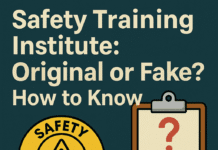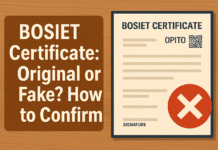
Top Safety Courses with Highest Salary in 2024
Safety is a paramount consideration in today’s dynamic work environment, with organizations prioritizing the well-being of their employees. As we step into 2024, the demand for safety professionals continues to rise, creating an opportune moment for individuals to enhance their career prospects through specialized safety courses. In this article, we will explore the top safety courses that not only ensure a secure work environment but also open doors to lucrative career paths.
Current Job Market Trends
Statistics on the Demand for Safety Professionals
According to recent labor market reports, the demand for certified safety professionals has witnessed a significant upswing, with companies recognizing the importance of robust safety measures. The global emphasis on workplace safety is reflected in the statistics, showcasing a steady increase in job opportunities for individuals with specialized safety certifications.
Growing Sectors Prioritizing Safety Measures
Various sectors, including manufacturing, construction, healthcare, and technology, are actively seeking professionals with expertise in safety protocols. The increasing focus on employee well-being has made safety courses indispensable for those aspiring to thrive in high-demand industries.
Top Safety Courses in 2024
NEBOSH Certification
NEBOSH (National Examination Board in Occupational Safety and Health) certification remains a gold standard in the field, covering a comprehensive range of occupational health and safety topics. This course equips individuals with the knowledge and skills needed to identify and manage workplace hazards.
OSHA Training Programs
The Occupational Safety and Health Administration (OSHA) offers a variety of training programs that cater to specific industries. OSHA certifications are widely recognized and provide a solid foundation in safety compliance and risk management.
Certified Safety Professional (CSP)
The Certified Safety Professional (CSP) designation is highly regarded and demonstrates an individual’s commitment to excellence in the safety profession. This course covers a broad spectrum of safety disciplines, making it a versatile qualification for various industries.
ISO 45001 Lead Auditor Course
The ISO 45001 Lead Auditor Course focuses on auditing occupational health and safety management systems. This certification is ideal for individuals interested in pursuing roles as safety auditors or consultants.
First Aid and CPR Certification
Basic first aid and CPR training are essential for any workplace. Individuals equipped with these skills can act promptly in emergency situations, potentially saving lives.
Defensive Driving Courses
Especially relevant for those in transportation and logistics, defensive driving courses enhance road safety awareness and reduce the risk of accidents.
Fire Safety Courses
Understanding fire safety protocols is crucial in various settings. This course covers fire prevention, evacuation procedures, and the proper use of firefighting equipment.
Construction Safety Courses
Construction sites pose unique safety challenges. Specialized courses in construction safety address these challenges, ensuring a secure working environment for all involved.
Hazardous Materials (HAZMAT) Training
For those dealing with hazardous materials, HAZMAT training is vital. This course educates individuals on the safe handling, transportation, and disposal of dangerous substances.
Environmental Health and Safety (EHS) Courses
Environmental health and safety courses focus on minimizing environmental impact and promoting sustainable practices within organizations.
Emergency Response Planning
Preparation for emergencies is crucial. This course guides individuals in creating effective emergency response plans to mitigate risks and ensure swift, organized responses.
Ergonomics Certification
Ergonomics certification is essential for individuals involved in designing workspaces, ensuring they adhere to ergonomic principles that enhance employee well-being.
Electrical Safety Training
Working with electricity requires specialized knowledge to prevent accidents. Electrical safety training covers the proper handling of electrical equipment and promotes a safe working environment.
Workplace Violence Prevention
In today’s world, preventing workplace violence is a top priority. This course equips individuals with strategies to identify and address potential threats.
Confined Space Entry Training
Confined spaces pose unique risks. This training ensures individuals understand the hazards and follow proper protocols when working in confined areas.
Here are some safety courses that have historically been associated with higher salaries:
- Certified Safety Professional (CSP):
- This certification is offered by the Board of Certified Safety Professionals (BCSP). It covers a broad range of safety topics, including risk assessment, hazard control, and emergency response.
- Occupational Safety and Health Administration (OSHA) Certification:
- Various OSHA certifications, such as the OSHA 30-Hour General Industry or Construction course, are highly valued. These certifications cover key safety regulations and practices.
- NEBOSH International General Certificate (IGC):
- Offered by the National Examination Board in Occupational Safety and Health (NEBOSH), this certificate is globally recognized. It covers health and safety management systems, risk assessment, and more.
- Construction Health and Safety Technician (CHST):
- Administered by the Board of Certified Safety Professionals (BCSP), this certification focuses on safety within the construction industry.
- Certified Industrial Hygienist (CIH):
- The American Board of Industrial Hygiene (ABIH) offers this certification, which is centered around industrial hygiene practices and ensuring a safe working environment.
- Process Safety Management (PSM) Certification:
- Relevant for those working in industries with high-risk processes, this certification emphasizes the management of hazardous materials and processes.
- Certified Environmental, Safety and Health Trainer (CET):
- Offered by the Board of Certified Safety Professionals (BCSP), this certification is for individuals who provide safety training.
- Certified Hazardous Materials Manager (CHMM):
- Administered by the Institute of Hazardous Materials Management (IHMM), this certification is for professionals dealing with hazardous materials and waste management.
- Safety Instrumented Systems Professional (SIS):
- Focused on the automation and control industry, this certification emphasizes the safety of systems that control potentially hazardous processes.
- Certified Safety and Health Manager (CSHM):
- Offered by the Institute for Safety and Health Management (ISHM), this certification is suitable for safety professionals with managerial responsibilities.
To ensure you're obtaining the most up-to-date and relevant information, consider checking recent job market trends and salary surveys in your region or industry. Additionally, networking with professionals in your field can provide valuable insights into the current demand for specific safety certifications.
Benefits of Pursuing Safety Courses
Increased Employability
Companies prioritize safety-conscious employees, making certified individuals more attractive to employers. Safety certifications enhance overall employability and open doors to a wide range of industries.
Higher Salary Prospects
Professionals with safety certifications often command higher salaries than their non-certified counterparts. Employers recognize the value of investing in employees who contribute to a safer workplace.
Contribution to a Safer Work Environment
Individuals completing safety courses play a crucial role in fostering a culture of safety within their organizations. This contribution goes beyond personal career benefits, positively impacting colleagues and the overall work environment.
Regulatory Compliance Advantages
Safety certifications ensure that individuals and organizations comply with industry-specific regulations. This not only mitigates legal risks but also demonstrates a commitment to meeting and exceeding safety standards.
Tips for Choosing the Right Safety Course
Assessing Personal Career Goals
Before choosing a safety course, individuals should assess their career goals and align them with the specific certifications that will enhance their skill set in the desired direction.
Researching Industry-Specific Requirements
Different industries have unique safety requirements. Researching and understanding these requirements will help individuals select the most relevant safety courses for their chosen field.
Considering Accredited Institutions
Opting for courses offered by accredited institutions ensures that the certifications hold credibility in the industry. Accreditation adds value to the qualifications earned.
Evaluating Course Content and Structure
A thorough examination of the course content and structure is essential. Individuals should choose courses that cover relevant topics comprehensively and provide practical skills applicable to their work.
How to Maximize Salary After Safety Course Completion
Negotiation Strategies for Salary Increments
Certified safety professionals can leverage their qualifications during salary negotiations. Highlighting the value they bring to the organization in terms of enhanced safety and regulatory compliance can lead to higher salary offers.
Continuous Professional Development
Staying updated on industry trends and acquiring additional certifications enhances professional development. This continuous learning approach not only adds value to individuals but also increases their earning potential.
Networking Within the Safety Industry
Building a strong professional network within the safety industry opens doors to new opportunities. Networking allows individuals to learn from peers, stay informed about job openings, and collaborate on safety initiatives.
Conclusion
In conclusion, investing in safety courses not only ensures a secure work environment but also opens doors to rewarding career opportunities. The diverse range of safety courses available caters to various industries and career paths, providing individuals with the flexibility to choose certifications that align with their goals. As we navigate the dynamic landscape of 2024, prioritizing safety education remains a key factor in personal and professional success.
NEBOSH OSHA and IOSH Qualifications for Safety Professionals
IOSH Safety Manager Qualifications
OSHA Safety Manager Qualifications
NEBOSH Safety Manager Qualifications
IOSH Safety Engineer Qualifications
FAQs
- Q: Are safety courses only beneficial for individuals in high-risk industries like construction and manufacturing?
- A: No, safety courses are valuable across various industries. While some courses may be industry-specific, many cover general safety principles applicable to any workplace.
- Q: How long does it take to complete a typical safety course, and are they available online?
- A: The duration varies depending on the course. Many safety courses offer online options, providing flexibility for individuals to learn at their own pace.
- Q: Can safety certifications enhance my career if I’m already employed in a non-safety-related role?
- A: Absolutely. Safety certifications add value to any role by demonstrating a commitment to workplace well-being. They can lead to career advancement and increased responsibilities.
- Q: Are safety courses recognized internationally, and will they enhance my job prospects abroad?
- A: Yes, many safety courses have international recognition. Holding certifications can certainly boost your employability globally, as workplace safety is a universal concern.
- Q: Are there any financial assistance programs or scholarships available for safety courses?
- A: Some institutions and organizations offer financial aid or scholarships for safety courses. It’s advisable to inquire with the specific course provider or relevant industry associations.
- Q: How often should I update my safety certifications to stay relevant in the field?
- A: The frequency of updates varies by certification and industry. It’s recommended to stay informed about changes in regulations and consider updating certifications every few years.
- Q: Can safety courses be customized for specific company needs, and do they cater to different job levels?
- A: Many safety training programs can be tailored to meet specific company requirements. They also often offer courses suitable for individuals at various job levels, from entry-level to managerial positions.
- Q: Will completing multiple safety courses significantly increase my salary?
- A: While there’s no guaranteed salary increase, holding multiple certifications can enhance your skill set, making you more competitive in the job market and potentially leading to higher salary negotiations.
- Q: Can I pursue safety courses part-time while working a full-time job?
- A: Yes, many safety courses are designed to accommodate working professionals. Part-time and online options provide flexibility, allowing individuals to balance their studies with their current commitments.
- Q: How do safety courses contribute to creating a safer work environment beyond personal benefits?
- A: Safety courses empower individuals to actively contribute to a culture of safety within their organizations. This collective effort creates a workplace where everyone is aware of and committed to minimizing risks.
























